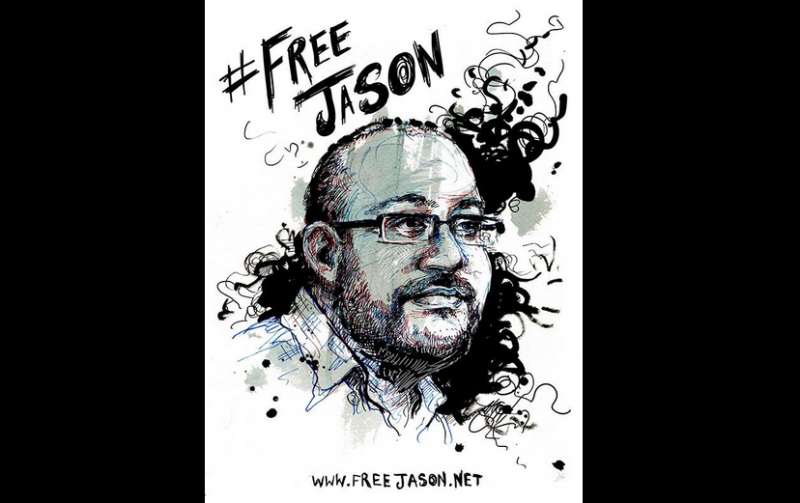
A photo drawn by Molly Crabapple, and shared by Ali Rezaian on Twitter.
This morning was the first day of trial for Washington Post reporter Jason Rezaian, after spending 10 months in jail over accusations of espionage in Iran.
In anticipation of the trial, the Washington Post's Executive Editor Martin Baron published the following statement on May 25 condemning the murky and unjust nature of Jason's arrest:
The shameful acts of injustice continue without end in the treatment of Washington Post correspondent Jason Rezaian. Now we learn his trial will be closed to the world. And so it will be closed to the scrutiny it fully deserves.
It’s worth recalling what kind of system we’re dealing with. Jason was arrested without charges. He was imprisoned in Iran’s worst prison. He was placed in isolation for many months and denied medical care he needed. His case was assigned to a judge internationally notorious for human rights violations. He could not select the lawyer of his choosing. He was given only an hour and a half to meet with a lawyer approved by the court. No evidence has ever been produced by prosecutors or the court to support these absurd charges. The trial date was only disclosed to Jason’s lawyer last week. And now, unsurprisingly but unforgivably, it turns out the trial will be closed.
Thomas Erdbrink, one of the few correspondents working for American media in Tehran along with Rezaian, explained in an article today the following about the case:
The judge in the case, Abolghassem Salavati, has a reputation for tough sentences, to the point that the European Union placed him on a blacklist in 2011 for human rights abuses. He has ignored foreign requests for court access, and it had been expected that only Mr. Rezaian and his lawyer would be present in the courtroom.
The trial is expected to last two to three days, Ali Rezaian said in a telephone interview from California, where he and his brother were born and grew up, adding that the lawyer had told the family of the judge’s decision on court access only on Monday. He denounced the decision, calling it “unconscionable.”
Pleas to free Jason have been strong on social media, especially within the human rights and journalism communities.
If Iran had a case against Jason Rezaian, it would try him in public. It doesn't and won't. http://t.co/0Ru5y0nr8y pic.twitter.com/F3Wux1SD88
— Kenneth Roth (@KenRoth) May 26, 2015
No real evidence has been used to backup claims that @jrezaian was gathering classified info in #Iran for the US gov't #FreeJason
— Holly Dagres (@hdagres) May 26, 2015
Mood: thinking of Jason Rezaian, whose trial in Tehran on “espionage” charges started today #FreeJason pic.twitter.com/OAxgFrOQ7b
— Gissou Nia (@GissouNia) May 26, 2015
Petition: We request the immediate, unconditional release of Jason Rezaian from Iranian custody @jrezaian #freejason https://t.co/DGkQRKqP6X
— Anna Fifield (@annafifield) May 25, 2015
Thanks to our friend @mollycrabapple for this new #freejason sketch to help get @jrezaian out of prison in Iran. pic.twitter.com/XnOgZi1DQn
— ali rezaian (@arezaian) May 23, 2015
#Iran must respect transparency in @jrezaian trial @FreeJasonYegi #FreeJason https://t.co/TUnDPzyQc3 pic.twitter.com/a4Vw2tAjBH
— CPJ (@pressfreedom) May 23, 2015






